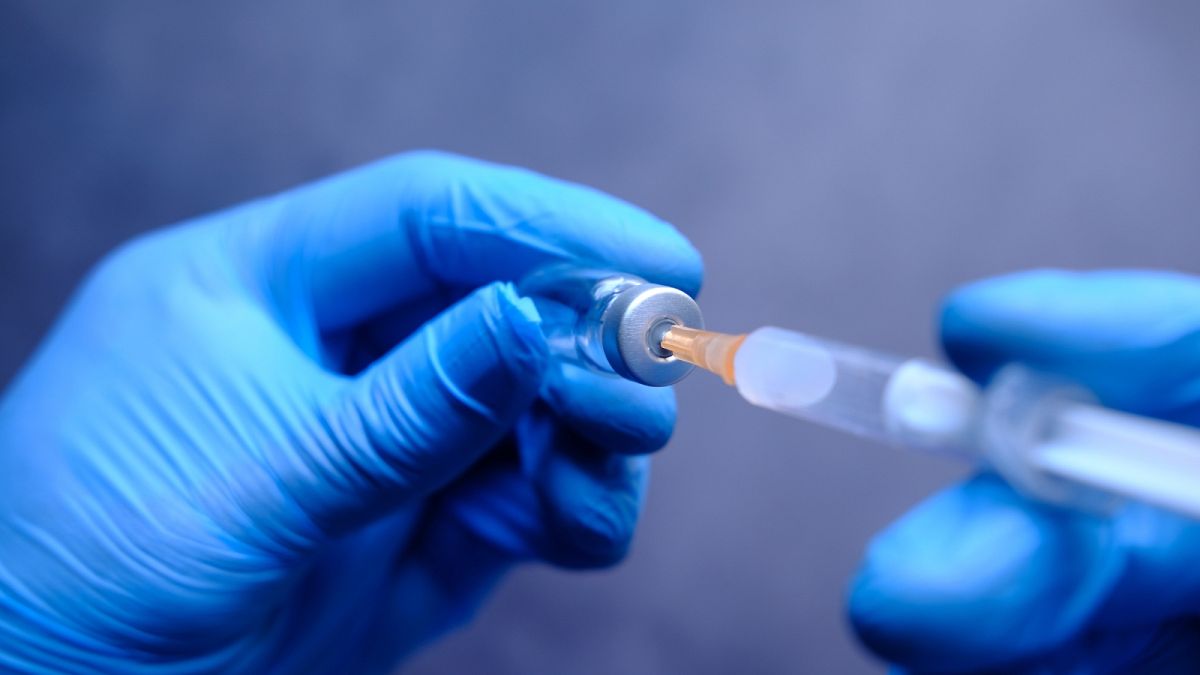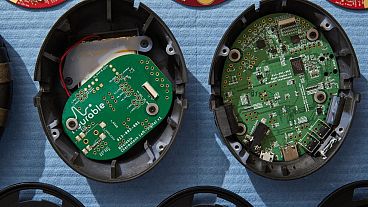In an exclusive interview with Euronews Next at Cannes Lions, Moderna's chief brand officer sets out why artificial intelligence has been so valuable.
Artificial intelligence (AI) has remarkably impacted the healthcare sector, particularly in vaccine development.
Speaking exclusively with Euronews Next at Cannes Lions, Kate Cronin, chief brand officer at Moderna, shed light on how the technology has become a central component of the company's operations - including how it develops new vaccines, approaches clinical trials and improves distribution strategies.
AI and the success of clinical trials
In the lifecycle of drug development, the clinical phase is a significant contributor to reaching successful treatments - notably, recruiting and then retaining patients.
Minimising attrition - the number of patients who discontinue their participation in a trial after enrollment or randomisation - is paramount for ensuring the integrity and success of clinical trials.
High dropout rates can result in biased or incomplete data, compromising the reliability of the study's findings.
To tackle the challenge, Moderna has embraced AI. The technology helps ensure diversity in patient recruitment and retention while at the same time identifying potential attrition points, allowing the company to intervene and prevent dropouts whenever needed.
"By using AI, we can figure out where we are going to have the most attrition and how we go in and influence so that we don't," she said.
This application of AI has already proven to be invaluable, and Moderna hopes that as a technique, it will also extend to general patient bases in the future.
By leveraging AI, healthcare providers could better understand patient behaviour and tailor interventions to ensure optimal patient engagement.
AI and equitable vaccine distribution
Another area that has seen significant improvement thanks to AI is Moderna's vaccine distribution strategy.
Through data analysis, AI algorithms can identify regions or communities with low vaccine uptake. With this information, Moderna can deploy targeted messaging and educational campaigns to increase vaccination rates in those areas.
"And I think there'll probably be a lot of strategies going forward that I don't even know about at this point. The future is wide open, which makes it so exciting," says Cronin.
Moderna's outreach endeavours will likely be facilitated by the positive shift in public attitudes and increased health literacy resulting from the COVID-19 pandemic, when "the health IQ of everyone went up," she explains.
"Everyone became aware of the manufacturer of the COVID vaccine, so suddenly you had incredible brand awareness, which is amazing. And then people became educated on COVID because they wanted to know as much as possible".
Moderna's position now entails fostering and nurturing the public's growing education and awareness.
"We have to be as transparent as possible so people understand how our vaccine works, the efficacy, the tolerability. And we are ensuring that we're constantly sharing that information with our customers," Cronin said.
The company has embraced the concept of "edutainment": engaging videos, animations, content series, and even collaborations with influencers to bring to life concepts beyond COVID, such as the potential of mRNA technology, "which holds enormous potential".
"We have more than 40 [mRNA] programmes in development," said Cronin, adding that the company is looking at "mRNA and infectious diseases, mRNA and rare diseases, latent viruses and oncology, just to name a few," which will likely be available in just "five to seven years".
MRNA is "a platform technology," meaning they are not "reinventing the wheel every time". However, "there's this huge promise of increasing efficiency and speed to market," she said.
This near future has also been only possible thanks to AI.
Developing new vaccines quickly
By harnessing AI algorithms, Moderna can rapidly analyse mutations and develop effective vaccines with shorter turnaround times.
"Artificial intelligence helped us expedite vaccine development 100 per cent," says Cronin, "it was what allowed us to figure out what mutations we needed to go after and expedite [the COVID-19 vaccine] to market," she notes, adding that thanks to AI they were able to "decode for COVID in 48 hours".
Cronin is especially excited about the oncology individualised neoantigen therapy - a cutting-edge approach in cancer treatment that involves identifying and targeting specific markers in a patient's tumour that activate the immune system to fight against it. But she’s also anticipating the launch of a combination vaccine, "so RSV, COVID and flu all being in one shot someday”.
"So that means you can get one shot to cover those illnesses, prevent you from getting sick, one time of the year, and for all seasons, versus going back three times to get three different shots", she notes, adding that it will be "huge for compliance as well”.
"We expect in the next few years we will have combo therapies or vaccines available," she said.
Watch the video in the media player above for more from this interview at the 2023 Cannes Lions Festival of Creativity.



